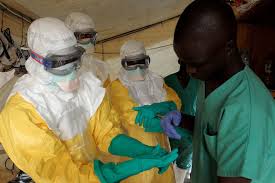He added that the World Health Organization would continue to support the West Africa in its effort to prevent, detect and respond to suspected cases.” Also making points in the statement, Dr Margaret Chan, WHO Director-General, said detecting and breaking every chain of transmission had been a monumental achievement, adding that so much was needed and so much was accomplished by national authorities, heroic health workers, civil society, local and international organizations and generous partners. “But our work is not done and vigilance is necessary to prevent new outbreaks.” She noted.
The statement cautioned that the three affected countries remain at high risk of additional small outbreaks of Ebola, like the most recent one in Liberia. “To date, 10 such flare-ups have been identified that were not part of the original outbreak, and are likely the result of the virus persisting in survivors even after recovery. Evidence shows that the virus disappears relatively quickly from survivors, but can remain in the semen of a small number of male survivors for as long as 1 year, and in rare instances, be transmitted to intimate partners.
“We are now at a critical period in the Ebola epidemic as we move from managing cases and patients to managing the residual risk of new infections. The risk of re-introduction of infection is diminishing as the virus gradually clears from the survivor population, but we still anticipate more flare-ups and must be prepared for them. A massive effort is underway to ensure robust prevention, surveillance and response capacity across all three countries by the end of March.” The statement reads in parts.
It pressed further that WHO and partners are working with the Governments of Guinea, Liberia and Sierra Leone to help ensure that survivors have access to medical and psychosocial care and screening for persistent virus, as well as counseling and education to help them reintegrate into family and community life, reduce stigma and minimize the risk of Ebola virus transmission.
Source:Leadership Online

 Declaring the end of the most recent outbreak of Ebola virus disease in Liberia and saying all known chains of transmission had been stopped in West Africa, the World Health Organization (WHO) yesterday hinted that new flare-ups are likely to occur. This was made known in a statement obtained by our correspondent in New York from the office of Dr Alex Gasasira, WHO Representative in Liberia. The statement warned that the job is not over, stressing that more flare-ups are expected and that strong surveillance and response systems would be critical in the months to come.
Declaring the end of the most recent outbreak of Ebola virus disease in Liberia and saying all known chains of transmission had been stopped in West Africa, the World Health Organization (WHO) yesterday hinted that new flare-ups are likely to occur. This was made known in a statement obtained by our correspondent in New York from the office of Dr Alex Gasasira, WHO Representative in Liberia. The statement warned that the job is not over, stressing that more flare-ups are expected and that strong surveillance and response systems would be critical in the months to come.




